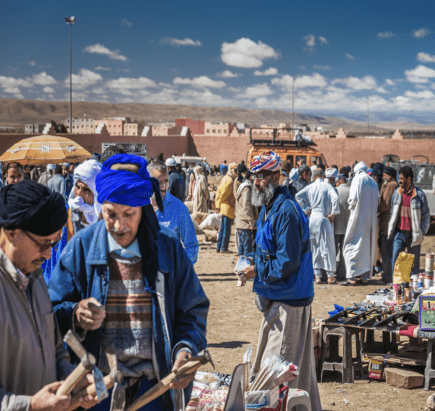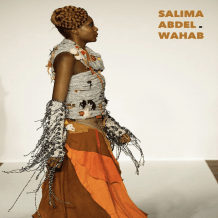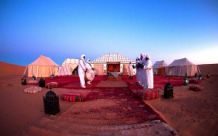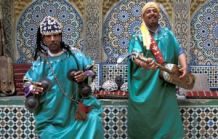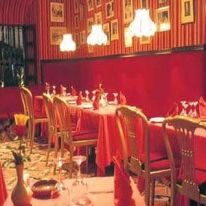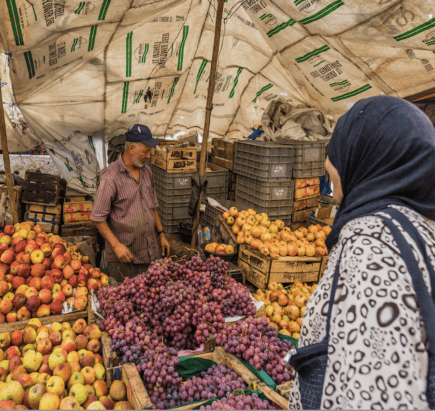
Explore the Rural Souks Outside Marrakech
Discover authentic Berber culture by exploring the rural souks outside Marrakech. These weekly markets offer local produce, crafts, and a genuine glimpse into traditional Moroccan life. Experience Berber rural life and absorb the character of the marketplaces where locals connect each week to sell and purchase goods. Visiting a Moroccan rural souk outside Marrakech lends to an insider view of social life where local producers sell their wares including, fruit, vegetables, and livestock.
Merchants from Marrakech sell essentials such as tea, coffee, sugar, packaged foods, cooking items, clothing, and electronics. Also shown at Marrakech rural souks are carpets, jewelry, and pottery generally less expensive than those in Marrakech. Other items available to buy at the souks outside of Marrakech are henna, spices, rugs, Berber slippers and leather sandals, pottery, djellabahs for men, caftan dresses for women and handmade wooden kitchen utensils.
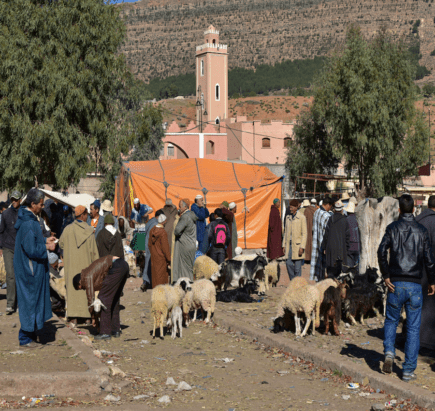
Top Souk Destinations: Marrakech Region- Berber Rural Life
Amizmiz – The region’s premier Berber souk runs Tuesdays. Beyond shopping, it serves as an excellent base for Atlas Mountain treks and authentic Berber homestay experiences. It is a good starting off point for treks in the surrounding Atlas Mountains and meeting Berber (Amazigh) in their local environment for mint tea and a meal served in their homes.
Tahanaout – Located 30km from Marrakech, this picturesque village hosts its souk on Tuesdays. Visitors can participate in pottery making and cooking demonstrations while enjoying views of olive groves and citrus orchards against the Atlas Mountains backdrop.
Set against the majestic backdrop of the High Atlas, the picturesque village of Tahanaout attracts visitors with its landscape and attractive sturdy Berber red clay buildings. The village which is 30 km from Marrakech is surrounded by olive groves, orange and lemon trees. Its souk is also held on a Tuesday. Pottery making and cooking demonstrations are on offer from the inhabitants of Tahanaout, you can learn how to make homemade bread, makoda, couscous, and other traditional regional dishes.
There are opportunities for bird watching whilst strolling along the riverbanks, where you can see Moroccan wagtail, white stork and cattle egret. You can trek to the Ouirgane, N’Fis and Ourika Valleys and the waterfalls at Setti Fatma. You can also ride donkeys or hire a 4X4 cross country vehicle. For travelers who would like to stay in Tahanaout consider a stay at Terres d’Amanar, an eco-lodge with views of the Atlas villages. Kasbah Angour is also nearby. Both properties can arrange tours and trekking along with 4×4 overland tours.
Weekly Souk Schedule
- Monday: Tnine Hem
- Tuesday: Amizmiz, Tahanaout
- Wednesday: Ijoukak
- Thursday: Khemis Ouirgane
- Friday: Aghmat
- Saturday: Asni
- Sunday: Sidi Ghiat
What to Buy: Souks Outside Marrakech
- Fresh produce and livestock
- Traditional crafts: carpets, pottery, jewelry
- Clothing: djellabahs, caftans, Berber slippers
- Household items: handmade wooden utensils
- Spices, henna, and local goods
The Tassa Ouirgane National Park and the Toubkal National Park provides great trekking opportunities in amongst the valleys and local Berber villages hamlets and fields with the Atlas mountains towering above them. You can visit the salt mines at Marigha. Here the Berbers have been mining salt by their traditional method unchanged for centuries. They transport the salt by donkeys and sell it locally.
For more information about Souks of Morocco Tour
Morocco’s Imperial Cities, Seaside Resorts, Sahara Desert, Berber villages, A Taste of Morocco, Magical Kasbahs, Ruins & Waterfalls, Absolute Morocco, The Best of Marrakech, Fes, and Ouarzazate

